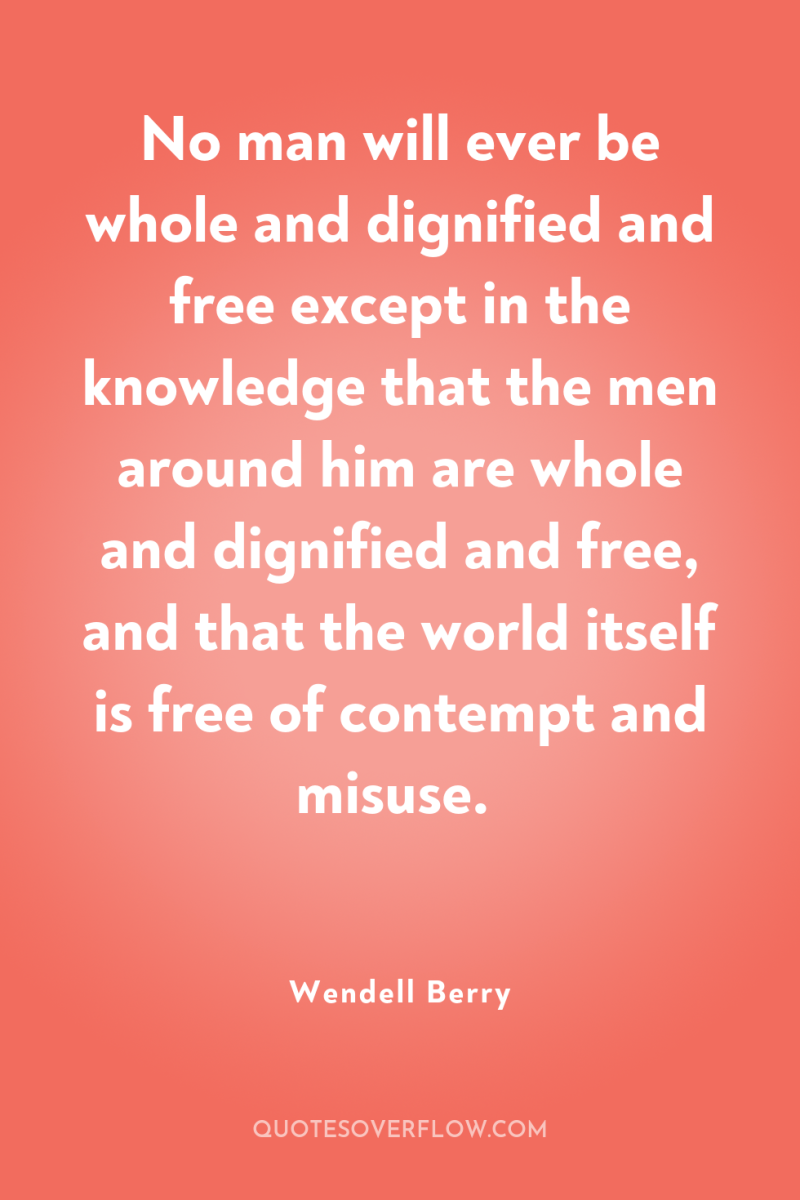
1
No man will ever be whole and dignified and free except in the knowledge that the men around him are whole and dignified and free, and that the world itself is free of contempt and misuse.Wendell Berry
2
If the white man has inflicted the wound of racism upon black men, the cost has been that he would receive the mirror image of that wound into himself. As the master, or as a member of the dominant race, he has felt little compulsion to acknowledge or speak of it; the more painful it has grown the more deeply he has hidden it within himself. But the wound is there, and is a profound disorder, as great a damage in his mind as it is in his society.Wendell Berry
3
From other stories that have been handed down to me I know that my people, like many others in the slave states, went to church with their slaves, were baptized with them, and presumably expected to associate with them in heaven. Again, I have been years realizing what this means, and what it has cost. First, consider the moral predicament of the master who sat in church with his slaves, thus attesting his belief in the immortality of the souls of people whose bodies he owned and used. He thus placed his body, if not his mind, at the very crux of the deepest contradiction of his life. How could he presume to own the body of a man whose soul he considered as worthy of salvation as his own? To keep this question from articulating itself in his thoughts and demanding an answer, he had to perfect an empty space in his mind, a silence, between heavenly concerns and earthly concerns, between body and spirit. If there had ever opened a conscious connection between the two claims, if the two sides of his mind had ever touched, it would have been like building a fire in a house full of gunpowder: somewhere down deep in his mind he always knew of the danger, and his nerves were always alert to it.Wendell Berry
4
Our present idea of freedom is only the freedom to do as we please: to sell ourselves for a high salary, a home in the suburbs, and idle weekends. But that is a freedom dependent upon affluence, which is in turn dependent upon the rapid consumption of exhaustible supplies. The other kind of freedom is the freedom to take care of ourselves and of each other. The freedom of affluence opposes and contradicts the freedom of community life. .Wendell Berry
5
As a people, we have been tolled farther and farther away from the facts of what we have done by the romanticizers, whose bait is nothing more than the wishful insinuation that we have done no harm. Speaking a public language of propaganda, uninfluenced by the real content of our history which we know only in a deep and guarded privacy, we are still in the throes of the paradox of the “gentleman and soldier.” However conscious it may have been, there is no doubt in my mind that all this moral and verbal obfuscation is intentional. Nor do I doubt that its purpose is to shelter us from the moral anguish implicit in our racism–an anguish that began, deep and mute, in the minds of Christian democratic freedom-loving owners of slaves.Wendell Berry
6
The essential cultural discrimination is not between having and not having or haves and have-nots, but between the superfluous and the indispensable. Wisdom, it seems to me, is always poised upon the knowledge of minimums; it might be thought to be the art of minimums. Granting the frailty, and no doubt the impermanence, of modern technology as a human contrivance, the man who can keep a fire in a stove or on a hearth is not only more durable, but wiser, closer to the meaning of fire, than the man who can only work a thermostat.Wendell Berry